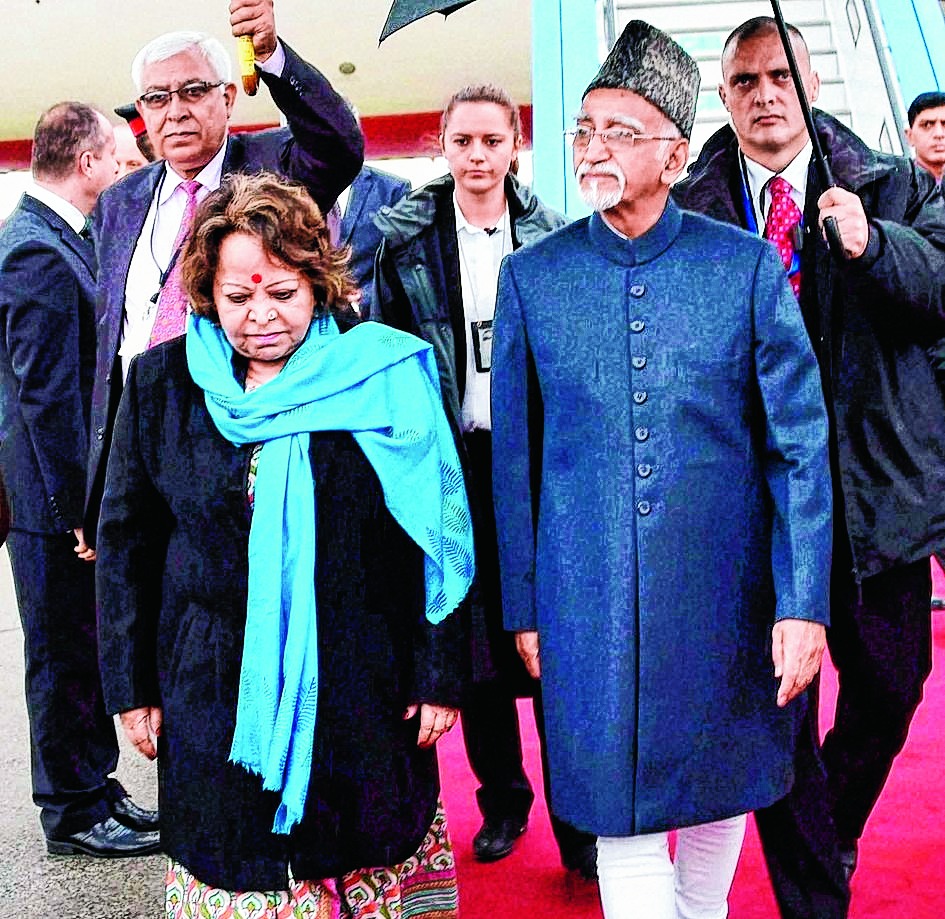
Budapest, Oct. 15: Vice-President Hamid Ansari arrived in the Hungarian capital today on a trip that has considerable political, economic and cultural significance.
The high-level visit comes after more than two decades when the then President, Shankar Dayal Sharma, had visited the central European country in 1993, said Sujata Mehta, secretary (west) in India's ministry of external affairs.
Hungary has a special relationship with Rabindranath Tagore, who had reached Budapest on October 26, 1926, and stayed in the country for almost three weeks.
In 2011, Hungary had served as the venue for an international conference on Tagore to commemorate the bard's 150th birth anniversary.
During his visit, Tagore had fallen ill and was treated at the quaint town of Balatonfured on the north shore of the lake Balaton. A Hungarian tourism brochure has a quote from Tagore that says: "I have seen almost all the countries of the world, but I saw nowhere such a beautiful harmony of the sky and the water than that I had the privilege to enjoy on the shore of Balatonfured filling my soul with rapture."
Mohammad Ataur Rahman is another respected Indian figure among Hungarians and considered a hero of the country's 1956 uprising for helping and saving the life of Arpad Goncz, who later served as President (1990-2000).
Rahman was India's charge d'affaires at Budapest in September 1956 when Hungary was controlled by the then USSR. The death of Stalin had led many Hungarians to hope that Hungary also would be "de-Stalinised".
Rahman helped Goncz make contact with Jawaharlal Nehru, who mediated on the behalf of the Hungarians with the Soviet government. The Indian Prime Minister also expressed sympathy and compassion for the Hungarian freedom fighters.
Nehru issued a statement in Parliament describing the Hungarian uprising as a people's movement. That was the first time that any head of government had spoken favourably about what had happened in Hungary then.
Former Indian foreign secretary A.P. Venkateswaran, who had met Rahman in Budapest, said the Hungarians were very happy with Nehru's stand.
The uprising was a short-lived affair. On October 24, Imre Nagy, a moderate who took over as Prime Minister, asked Khrushchev to move the Russian troops out. For five days, there was freedom in Hungary. The new Hungarian government introduced democracy, freedom of speech and freedom of religion. Then, on November 3, Nagy announced that Hungary would leave the Warsaw Pact.
Soviet leader Nikita Khrushchev was not going to allow this. He claimed he had received a letter from Hungarian communist leaders asking for help. At dawn on November 4, a 1,000 Russian tanks had rolled into Budapest. They destroyed the Hungarian army and captured Hungarian Radio. The last words that were broadcast were: "Help! Help! Help!"
Some 4,000 Hungarians were killed. Hungary finally broke away from Soviet hold after the disintegration of the USSR.
When Hungary's first democratic elections were held in 1991 and Goncz became President, he had recalled: "In those months (in 1956) the Indian embassy in Budapest became the embassy of the Revolution."
Indian diplomat Moni Chadha None says the Hungarians never forgot Rahman. One of the first acts of their new President was to visit India. Rahman had long retired by then, but the Hungarian ambassador in Delhi told the Indian ministry of external affairs that the President would like to meet him.
The President insisted on breaking protocol to meet him personally at Rahman's house at A-9/25 Vasant Vihar. President Goncz warmly embraced Rahman as he entered, recalled None.
Hungary today supports India's bid to become a member of the Nuclear Suppliers Group (NSG), saying it would strengthen nuclear non-proliferation and make global nuclear commerce more secure.
Mehta, secretary (west) in the foreign ministry, said Ansari would raise with Hungary the issue of cross-border terrorism affecting India. The Vice-President will have bilateral meetings with Hungary's President, its Prime Minister and the Speaker of the national assembly.
Informed sources said Hungary has offered to "incentivise" Indian companies that might leave the UK following the Brexit referendum.











